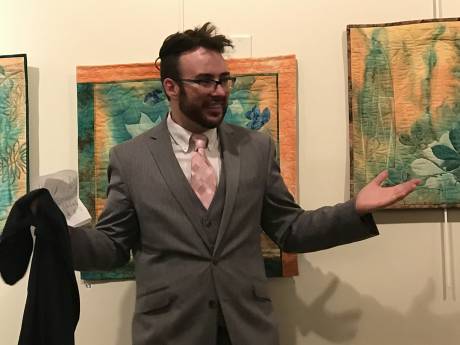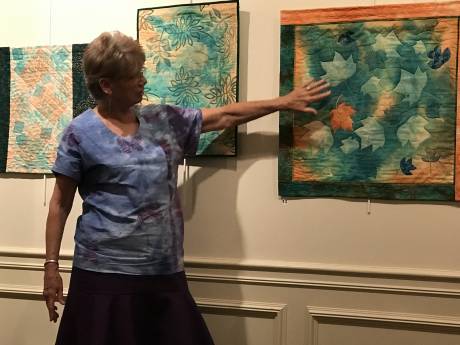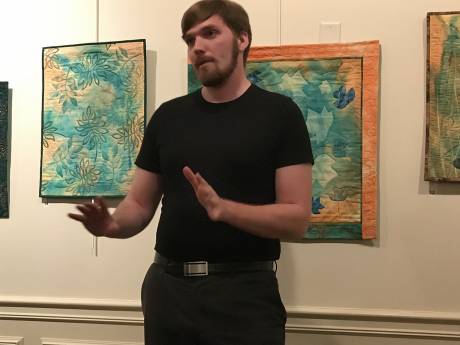Stories from
Man accused of sex crimes acquitted by jury
The three-day trial of a man accused of sexually attacking a person on South Main Street in Batavia ended in his acquittal on all counts after the jury deliberated for 90 minutes today.
Kyle R. Shea was indicted by a grand jury in February on counts criminal sexual act in the first degree, criminal sexual act in the third degree, and first-degree sexual abuse.
The charges came after an investigation into allegations that Shea forced anal sexual conduct on another person, and that the alleged victim lacked the capacity to consent. in June or July of 2015.
District Attorney Lawrence Friedman said he didn't know why the jury reached the verdict it did and he had no further comment.
Fully involved car fire reported after accident on Route 77 at Ledge Road, Alabama
A fully involved car fire is reported after a two-vehicle accident on Route 77 at Ledge Road, Alabama.
There are injuries
Vehicles are blocking.
Alabama fire and Mercy EMS dispatched.
UPDATE 7:28 p.m.: A second ambulance requested to the scene.
UPDATE 7:36 p.m.: Alabama and Pembroke fire police requested to the scene.
UPDATE 7:52 p.m.: An ambulance from Medina is on scene.
An interview with Rep. Chris Collins on health care policy

President Trump at a meeting with Chris Collins, right, and other members of Congress.
Photo: Getty Images. Copyright 2017. Published with permission.
The future of health care coverage for some Americans has become uncertain. If your employer provides health coverage through an HMO or PPO, you're probably OK. If you're on Medicare or Medicaid, you're probably OK. But if you're one of the 51 million of U.S. residents who must buy your own coverage, you might be watching the news coming out of Washington with concern.
After seven years of promising to repeal and replace the Affordable Care Act, the Republicans in Congress have been unable to do either. Now, President Trump is threatening to defund the CSRs (cost sharing reductions) that help insurance companies contain coverage costs. He may not be able to do that, at least in New York, but there are other actions Trump can take to hamper the health care exchanges. The funding reductions and uncertainty are creating turmoil for insurers and consumers alike.
There are a reported 5,074 Genesee County residents who purchased their health insurance through the New York exchange for 2017.
A month ago, The Batavian spoke with Rep. Chris Collins at length about his views on health care, with a follow-up interview last week, and learned that Collins doesn't think anybody needs worry about their coverage. When the House repeal and replace bill, the American Health Care Act was still alive (at the time of our first talk), he was confident that bill would be better for New Yorkers. Last week, when the so-called "skinny repeal" was still on the table (it since failed in the Senate), he thought whether it passed or not, New Yorkers would still have no trouble getting the coverage and care they needed.
The Congressional Budget Office has issued reports saying from 15 million to 25 million Americans could lose health benefits if either of those bills passed, but when pressed, Collins maintained there remained viable ways for anybody who needed coverage to get coverage.
Collins believes we have the best health care in the world, that Medicaid should be the same in all 50 states, that Republicans will never support universal health care, and he plans to continue the push to shift the cost of Medicaid from county taxpayers to the state.
"My buddy just had two grandchildren that were born twins two and a half pounds each," Collins said. "They finally just came home at six pounds. In days gone by the outlook for those kids would not have been good. The advances are tremendous in this country. I think we stand alone in this country with many of those and there's a cost that goes with it. We can get better everywhere. We have to go step by step but we've got to get rid of Obamacare (the Affordable Care Act). That's imploded."
That implosion, Collins said, is not because of anything the Republicans did -- eliminating support for risk corridors, creating uncertainty about the future of funding for individual market insurance, blocking the expansion of Medicaid, and not working on amendments to the original language of the act; rather, Collins said, it is because the ACA was doomed to fail.
"It was a house of cards that was never realistic," Collins said. "I called it out for what it was on day one."
On risk corridors, that was a flawed plan from the beginning, he said.
"I'm saying they (insurance companies) gamed the system," Collins said. "They priced the product low when they knew they would be reimbursed by the government. That all turned to mask how bad Obamacare was. It was masked for three years through this risk corridor reimbursement. Well, now the emperor's got no clothes and we see him standing there naked. That's what ended up happening when we stopped (the risk corridors). Now they have three years of actuarial data to know where it's got to be priced and sure enough, Blue Cross Blue Shield just announced a 47-percent price increase."
There are reports that the insurance companies are owed an more than $5.8 billion. Collins said they are owed nothing.
"They got their money," Collins said. "They got their money and now they have three years of actuarial data. They should be on their own."
Provisions in the Affordable Care Act such as risk corridors were meant, according to groups such as the Kaiser Foundation, to provide safe guards for insurance companies against taking on a wave of people with pre-existing conditions.
Remember, before the ACA, those $51 million Americans in the individual pool could be denied coverage if they didn't already have insurance or changed insurance -- such as going from an employer-based plan to an individual plan -- if they had a pre-existing condition, or that condition might not be covered. The ACA, which became law in 2009 and took effect in 2014, made that practice illegal. Risk corridors were intended to recognize a period of instability while insurance companies took on millions of people who had been denied coverage because of pre-existing conditions all in a short period of time.
The risk corridors were not directly funded by the Federal government. It was expected that some insurers would under estimate and some would over estimate their costs. The risk corridors set a range of acceptable variance and then used profits from above that range to reimburse insurers who fell below that range.
Collins contends no insurance companies were profitable in the first three years of the ACA, or profitable enough to fund the risk corridors.
"The young and healthy did not sign up," Collins said. "They are not signing up. Therefore the people in these plans are sicker. Those are the ones who flocked to them. There was never any money on the surplus side to give to the companies who all, in a race for the most patience, I would say negligently, priced their products knowing their losses would be covered by the federal government for a period of time. That was the house of cards. Set to fail. And it has failed. It was not anything the Republicans did."
According to a study by Common Wealth Fund, some insurers lost their shirts under the ACA while others raked in record premiums. Then, in the first quarter of this year, health insurance providers had their most profitable quarter ever. The volatility over the past three years in the health care exchanges is exactly what you would expect to find in a newly created market, according to a paper co-authored by conservative economist Craig Garthwaite.
The loss of risk corridor protection isn't the only shoal in the storm weathered by the Affordable Care Act.
There were more than 100 lawsuits filed against the ACA, some of them backed by Republicans. The fact that some of those challenges prevailed is evidence, Collins suggested, that the health care insurance law was bound to fail.
"This was a fundamentally flawed plan trying to get universal health care," Collins said. "The biggest issue was the Supreme Court struck down the exchanges being mandated across the country. That was the beginning of the end. That was not the Republicans. That was the Supreme Court ruling on an unconstitutional aspect of Obamacare. This thing was bound to fail."
The Affordable Care Act was meant to help lower the cost of health insurance for the approximately 51 million Americans (in a nation of 302 million adults, or 17 percent of the population) who are not covered by employer-provided health insurance or already receiving Medicaid or Medicare. Most of these Americans, prior to the ACA, did not have health coverage. Since passage of the ACA, an additional 20 million people in the United States now have health insurance.
The ACA expanded Medicaid (though some states rejected the expansion) to include low-income workers (that's about six million of the 20 million mentioned above). There are also more people covered under their parents' plans because the law extended required coverage for children up to age 26.
A key provision of the ACA -- and one most reviled by conservatives -- is the individual mandate. The mandate was intended to push healthy young people toward signing up for insurance so their premiums (because on average they wouldn't require care resulting in claims) would help keep costs down for people with more health concerns. People in the individual market who don't buy insurance can be assessed a tax penalty.
The bill also required companies with more than 50 employees to provide insurance. Like the individual mandate, this provision has been unpopular and one report said as many as 22 percent of small businesses are hiring few workers as a result.
One thing Collins believes about the ACA is that the bill was really a trick to institute universal health care in the United States.
"The Democrats want universal health care," Collins said. "No if ands, or buts. Hillary Clinton wanted that. Barack Obama wanted that. They never could get there and that's when we ended up with the abomination that I call Obamacare."
At the time the ACA passed, the Democrats controlled the House and the Senate, with enough votes in the Senate (58 Democrats and two Democrat-leaning independents) for Obama to get through just about any legislation he wanted, including single-payer, Medicare-for-all, or any other universal system.
The ACA seems to be largely based on proposals first put forward by the conservative think tank, the Heritage Foundation. That that is not an indisputable fact. Stuart Butler, a Heritage director, says it's not true but there are documents out there that show Heritage and Butler pushing coverage for all Americans with an individual mandate.
At the time Butler was offering any kind of proposal for health care, Bill Clinton was president and Hillary Clinton was heading a commission aimed and creating universal health care for the nation. To counter the Clinton plan, Republicans were proposing alternatives, including the Heritage plan.
Republicans remain steadfastly opposed to universal health care, Collins said, even though Trump has seemingly promised just that during his campaign for president.
“We’re going to have insurance for everybody,” Trump said on Jan. 11. “We’re going to have a healthcare that is far less expensive and far better.”
In an interview with 60 Minutes in September 2015, he said, “I am going to take care of everybody. Everybody’s going to be taken care of much better than they’re taken care of now.”
Collins deflected questions about Trump's promises.
"I don't speak for the president," Collins said. "I would say on the campaign trail he talked about a lot of different topics."
And in response to a follow-up question, Collins said, "The life I live is here now, and Republicans will never support universal health."
Interestingly, not all conservatives agree. The American Conservative has recently published two columns suggesting that within five years Republicans will embrace universal health care and that universal catastrophic coverage is what is best for the nation.
Collins is opposed to universal health care, he said, because he believes it's inferior to what we have now.
"(I) would point to the situation in Europe certainly the situation in Canada where we have Canadians pouring over the border to get health care that's just not available within their universal health care system," Collins said. "You look to Europe; the elderly are denied health care. The ROI is not there, whether it's a new hip for it or something else -- how old are you? What's your life expectancy? Some of the life-saving cancer drugs are not available in Europe from a cost perspective because those nations budget health care."
According to this op-ed in the Denver Post from 2009, the idea that Canadians come here for routine coverage is a myth, through when Canadians do come to the U.S. for care, for whatever reason, their universal healthcare plan covers their medical expenses. (Colby Cosh, a journalist in Canada, read the Denver Post piece after I sent him a link on Twitter and he said, "Some of its plain nonsense, like 'no waits for urgent care', obviously."
There does seem to be some issue with the elderly being denied care in Great Britain (care rationing), but apparently, that is not how their care should be handled since they can sue if denied care.
While there is a report in England recently of patients being denied expensive treatment, those same treatments are available elsewhere in Europe, and American pharmaceuticals tend to be substantially less expensive in Europe than the United States.
The idea, however, that drugs make health care more expensive for Americans, is a myth, Collins said.
"There's so much misinformation out there," Collins said. "For instance, if you surveyed the average American they will tell you the biggest cost driver and the biggest problem we have are prescription drugs. That's what they say. But that's not the reality. As I understand that prescription drug coverage is nine percent of health care cost. Ninety-one percent is everything else. So if all these, and they are expensive drugs, and as I just illustrated through my ill-venture down in Australia, nine out of 10 drugs are going to try and fail, there's a huge cost. It's got to be recovered one way or the other but you're simply not going to have new R&D and new drugs to cure the next disease."
Pharmaceutical research, however, is not a totally free-market system. While drug companies fund about $60 billion of the $100 billion spent on R&D each here, about 1/3 of that tab is paid for by taxpayers (with the rest covered by charitable contributions). Many drugs are formulated based on publicly financed research and some drugs are developed through a public-private partnership.
Even so, Collins expressed no interest, when asked, about reforming the current patent law system that gives drug makers monopoly pricing on drugs, though he did say he supports making it easier for patent-expired drugs to enter the generic market.
"None of us would ever suggest that anything's perfect," Collins said.
He said he's especially interested in reducing the approval process around what is called "biosimilar" drugs. Biosimilars are the same in every respect to FDA approved drugs, except for some inactive ingredients. The process for biosimilars was supposed to be reformed under the ACA.
While not addressing the patent issue, he said he would like to see new drugs get to market faster.
"It begins with things that we've done, that I helped with, with the FDA and the 21st Century Cures Act, to get drugs to the market quicker," Collins said. "I sat down with the administrator of the FDA and asked her about her personnel needs and the skill set she needs to get drugs to market quicker, to save lives, to treat illnesses, to treat debilitating diseases because the quicker they get to market the cheaper they'll be. There's a cost. Whatever it does and it takes you eight years to get it to market, and we can get it down to five years, we can save the net cost, and I believe it will be substantially reduced."
Whether the Republicans the Republicans let the ACA die, repeal it outright, repeal and replace it, Collins doesn't believe that people are going to die for lack of health insurance.
The poor, he said, will continue to be covered by Medicaid. As for people not eligible for Medicaid, nobody will face bankruptcy because they can't afford health care.
"We, Republicans, and everything we've said are they don't have to go bankrupt," Collins said. "That's was the old system. The old system said, because it was no safety net whatsoever, you have to go on Medicaid. The only way to get on the Medicaid was to go bankrupt. Well, that's not where we are today. Where we are today -- we don't know where it's going to end but certainly, American Health Care Act said very simply, you can get insurance."
It might be expensive insurance because if you were without insurance when you developed what carriers would consider a pre-existing condition, the insurers could charge you premiums that are 30 percent higher for 12 months.
"You are perhaps in that uncomfortable slice of working poor and your numbers didn't work and you did not have coverage through your employer and you made the decision to not carry that insurance," Collins said. "There were other things that took priority in your life. We're not going to now force you into bankruptcy, which was the old way. What we said is there would be a 30 percent added cost for 12 months then you would go back into the community rate. Personally, I think that is a pretty fair compromise."
The AHCA seems to be dead, at least for now, and Collins defended it at length during our conversation. You can read his comments in the transcript (links to the full interviews below).
Even with the AHCA seemingly consigned to legislative history, Collins said the proposal he backed to provide mandate relief for cash-strapped counties hit with the high costs of supporting Medicaid isn't dead. He will continue to pursue that legislation, he said.
"John Fasso and I are going to continue to pursue our Medicaid language and find something else to attach it to because we have some other must pass stuff," Collins said. "We've got S chip that's got to pass. We've got some extenders that need to pass, so let's just say John Fasso and I are not giving up on the Medicaid piece regardless."
Many economists have raised concerns about the lack of free market mechanisms in health care, a key factor in driving up costs. Employer-provided health insurance distorts the market, creates what economists call the principle-agent problem (the ultimate consumer isn't making the key buying decisions) and information asymmetry (buyers have less information than sellers). Liberal economist Dean Baker has been especially vocal about the American Medical Association, which he labels a "cartel." The "cartel" he contends, is able to artificially reduce the number of hospitals and doctors in the United States. to constrict supply and drive up costs.
The United States has only 3.3 hospital beds per 1,000 people, compared to 3.7 in Canada and 4.2 in the United Kingdom. At 2.2 physicians per 1,000 people, the United States ranks 52nd in the world, though a tad higher than Canada or the United Kingdom. The United States spends more, much more, per capita on health care than any other nation on earth, yet ranks 43rd in life expectancy.
We asked Collins about the underlying causes of high health care costs in the United States and he didn't answer the question directly.
"Well there's one big issue and it's lifestyle," Collins said. "Two-thirds of our country is obese. Through that, all kinds of things happen whether it's diabetes, whether it's joints, whether it's heart, or whether it's cardiovascular. If you want to look up and down in health in the U.S., it's we got a weight problem. So what can we do? We got to talk about it. We've got to remind people of it. Health insurance companies now have fitness plans. Government plays a role and then people play a role. I'm just a firm believer in personal accountability. We make decisions good and bad. Certainly, our health decisions are more under our control, not to say that bad things genetically don't happen but there's an awful lot of the health care world that we do control individually. We're not doing a very good job."
PDF transcripts for full interviews:
Non-emergency numbers for 911 Center back in service
The non-emergency numbers for the Genesee County Dispatch Center are back in service.
You can call non-emergency numbers for local law enforcement contacts.
For an emergency, dial 9-1-1.
Larry Gatlin to perform at Batavia Downs Sept. 16
Press release:
Batavia Downs Gaming & Hotel is proud to announce that Grammy Award-winning American country and Southern gospel singer Larry Gatlin will be appearing at the Paddock Room Events Center on Saturday, Sept. 16th.
An original member of the legendary trio the Gatlin Brothers, some of Gatlin's biggest hits include "Broken Lady," "All the Gold in California," "Houston (Means I'm One Day Closer to You)," "She Used to Be Somebody's Baby," and "Talkin' to the Moon." In addition to being inducted into the Grand Ole Opry in 1976, the trio has been nominated for awards by the Country Music Association, the Academy of Country Music and the Music City News Awards, among others.
Tickets will be available at www.BataviaConcerts.com beginning at 10am on Friday, Aug. 4th. Individual tickets will be $10 for General Admission while VIP tickets will be $15. Tickets can also be purchased in-person at the Batavia Downs Gaming & Hotel “Made in America” store located in the lobby.
“Coming on the heels of our successful outdoor concert series, we’re excited to continue our live entertainment offerings through the fall and winter,” said Henry Wojtaszek, president & CEO of Batavia Downs Gaming. “We proudly welcome Mr. Gatlin to Batavia Downs Gaming & Hotel as we continue to strive to be the region’s premier entertainment destination.”
Doors will open at 7 p.m. and the show will begin promptly at 8 p.m. Hotel room packages can be purchased at thehotelatbataviadowns.com by using the code: GATLIN. Hotel booking includes two General Admission tickets to the concert. Each concert ticket is also redeemable once at Player’s Club in the three days following the concert for $10 Free Play to be used on one of Batavia Downs Gaming’s 800+ gaming machines. Additional information may be found at www.BataviaDownsGaming.com.
Law and Order: Two DWI arrests
Michael A. Young, 36, East Avenue, Attica, is charged with DWI, driving to left of pavement markings and speeding. Young was allegedly driving 75 mph on Main Street in Alexander at 2:26 a.m. when he was stopped by Deputy Howard Wilson. Further charges pending results of a blood test.
Creagan Tuirc MacLaren, 18, of West Kendal Road, Holley, is charged with DWI, driving with a BAC of .08 or greater, and unsafe start. MacLaren was stopped at 11:17 p.m. Sunday on Route 77, Darien, by Deputy Jenna Ferrando.
$10K raised by Stafford members for Houseknecht scholarship

A members-only tournament at Stafford Country Club raised $10,000 for the Michael Houseknecht Scholarship Fund at Batavia High School.
The check was presented last night in the clubhouse.
Photo and info submitted by Lizabeth Starkweather.
Traveler's dog missing in East Pembroke

Sadie is missing near the Pembroke Travel Plaza.
Alyssa Coker has been traveling from California to New Hampshire with her mother and three dogs. They stopped for a break at the Pembroke Travel Plaza yesterday and when it came time to get the dogs back into their vehicle, a diesel pulled up behind them and the driver released his air brake, which startled Sadie.
The 2-year-old black border collie mix weighs about 50 pounds. She was able to bolt away, running past the plaza building, past the gas station and into the woods.
"We have been searching for her but haven't found her yet," Alyssa said. "I am completely devastated, heartbroken and desperate to find her."
Some residents in the area have aided in the search.
She was last seen with a teal-colored leash and collar. There is current contact info on her tags. She is micro chipped. She is skittish, but she may not run if people approach her.
Alyssa's number is (209) 815-0233.
UPDATE: Alyssa requests that anybody who sees Sadie to not approach her. There have apparently been sightings and Sadie has fled. Aylssa says Sadie is scared and skittish. There are professional volunteer trackers helping her. She asks for phone calls from anybody seeing Sadie.
Photos: City host's National Night Out event at Birchwood Village

The City of Batavia held its annual National Night Out at the Birchwood Village Apartments, with Batavia PD, City fire, and other city agencies interacting with community members and learning about safety issues and city services.
Photos by Alecia Kaus/Video News Service.








Non-emergency numbers not working for 9-1-1 Center
Non-emergency phone numbers for the 9-1-1 Center are currently not working.
You can still phone in an emergency by dialing 9-1-1, but if you're trying to reach a dispatcher, or Batavia PD, or Le Roy PD, or the Sheriff's Office, with a non-emergency call, the usual numbers are not working.
Batavia PD can be contacted for non-emergencies at (585) 345-6351. The administrative lines are (585) 345-6444.
Le Roy PD and the Sheriff's Office can be reached at (585) 343-5000.
However, if you have an emergency, dial 9-1-1.
Bitty is missing in Ross Street area

Bitty is missing. Slipped out of her house last night. She was last seen near Main and Ross going through the funeral home parking lot.
UPDATE Wednesday, 5 p.m.: Bitty is home, safe.
Lost pup on State Street

David Austin said this dog just wandered into his yard at 256 State St., which is next to the high school. He's hoping somebody comes and picks it up soon. Dave can be reached at (585) 300-3441.
UPDATE 9:12 p.m.: The puppy is back home, safe.
Byron-Bergen student selected for national leadership conference in D.C.

Press release:
Byron-Bergen Middle School Student Zoey Shepard will be taking part in an extraordinary leadership development experience at the 2017 Junior National Young Leaders Conference (JrNYLC) in Washington, D.C.
The Envision program provides a historical view of leadership and encourages young scholars to develop their own leadership skills and strategies for success in the 21st century.
Zoey was nominated by faculty and staff at Byron-Bergen Elementary School based on her achievements.
She is a leader in student government, a recently admitted into the ACE Program at Genessee Community College (SUNY), a saxophone player, basketball and both chorus (Byron-Bergen and All County). Zoey has is achiever who is capable of growing into a future leader for our country.
“The Junior National Young Leaders Conference enables students to recognize their own leadership abilities in the context of great men and women from the past and present,” said Andrew Potter, M.A.; M.A. NEJS, the chief academic officer for Envision.
“They return home with new confidence in their ability to make a positive impact in their school and communities. Washington, D.C. , serves as the perfect backdrop for this inspiring program to generate a new generation of U.S. leaders.”
At the six-day conference, sixth-, seventh- and eighth-grade students take part in fun and exciting workshops and participate in simulations to expand their leadership abilities.
Scholars explore historically significant sites, such as Harpers Ferry National Historical Park and memorials throughout the nation's capitol to reflect upon and learn from leaders and events of the past.
“The students gain a greater sense of themselves, their roles to preserve American democracy, and their responsibilities as tomorrow’s leaders,” Potter said.
JrNYLC prepares students to utilize their improved leadership skills to promote positive change in their schools and communities through social advocacy. The program runs from Aug. 5th- 11th. Students will work with their peers to create action plans for change to put into practice when they return home.
For more information about the Junior National Young Leaders Conference, visit www.envisionexperience.com/Leadership.
Collins cosponsors $5 billion border security legislation
Press release:
Congressman Chris Collins (NY-27) cosponsored legislation that enhances law enforcement at our borders and provides resources to improve security at ports of entry.
The Border Security for America Act authorizes $5 billion over four years to carry out staffing increases and infrastructure improvements. Additionally, the bill directs the Department of Homeland Security (DHS) to implement biometric exit-entry systems at all points of entry, exempting U.S. and Canadian citizens from screening.
“Our northern border is an economic asset to Western New York and we need to make sure we move people and products across safely and effectively,” Collins said.
“I am fully supportive of increased national security measures, like those included in this bill, but worked with my colleagues to make sure we avoid disruptions to both American and Canadian citizens that might result from new protocols.”
In February, Collins corresponded with former DHS Secretary John Kelly and CBP Acting Commissioner Kevin McAleenan expressing a deep concern regarding the department’s proposed expedited implementation of the biometric exit-entry system.
Collins cited impacts to Western New York related to trade and tourism and pointed out the differences between the northern and southern borders when it comes to security. As a result, DHS exempted American and Canadian citizens from their initiative.
Now, this new House legislation proposed by House Homeland Security Committee Chairman Michael McCaul (TX-10) carries the same exemption while providing expanded resources for border security.
“Our northern and southern borders face different needs when it comes to security,” Collins said. “Chairman McCaul took the needs of Western New York into careful consideration when drafting this language and I thank him for his efforts.”
The Border Security for America Act:
· Authorizes a Border Wall — Requires the deployment and construction of tactical infrastructure and technology to achieve full operational control and situational awareness. This deployment includes wall, fencing, technology, and other barriers.
· Secure and Fast Ports of Entry — Authorizes necessary resource investments to improve and enhance our ports of entry. Targets illegal immigration and drug trafficking at our ports of entry, while increasing lawful trade and travel.
· More Boots on the Ground — Adds 5,000 Border Patrol Agents and 5,000 CBP Officers and streamlines the way that veterans and existing local law enforcement officers can be hired.
· More Air and Marine Flight Hours – Increases the number of annual flight hours of CBP’s Air and Marine Operations and prioritizes requests for support from the Chief of the Border Patrol to secure the border.
· Forward Operating Bases – Directs DHS to upgrade existing forward operating bases to a minimum standard.
· Use of the National Guard – Authorizes use of the National Guard along the Southern Border to help with aviation and intelligence support and allows the reimbursement for states that call out the National Guard to help secure the border.
· Targets Visa Overstays — Identify visa overstays through full deployment of the Biometric Entry-Exit System at all ports of entry while exempting American and Canadian citizens
· Border Patrol Access to Federal Lands — Prohibits Federal agencies from impeding, prohibiting, or restricting CBP activities on federal land located within 100 miles of the Southern Border to execute search and rescue operations, and to prevent all unlawful entries into the United States.
· Support Local Law Enforcement — Authorizes the Stonegarden grant program at $110 million for state and local law enforcement to aggressively fight drug trafficking, smuggling, and other crimes on the Southern Border.
To read the text of H.R. 3548, Border Security for America Act, click here.
Collins introduces legislation aimed at prohibiting states from enacting gun laws more restrictive than federal statutes
Press release:
Congressman Chris Collins (NY-27) has proposed new measures for protecting Second Amendment rights by introducing legislation to limit states authority when it comes to regulating rifles and shotguns, commonly used by sportsmen and sportswomen.
The Second Amendment Guarantee Act (SAGA) would prevent states from implementing any regulations on these weapons that are more restrictive than what is required by federal law. Upon passage of this bill, most of the language included in New York State’s Secure Ammunition and Firearms Enforcement (SAFE) Act of 2013 signed into law by Governor Cuomo would be void.
“This legislation would protect the Second Amendment rights of New Yorkers that were unjustly taken away by Andrew Cuomo,” Collins said. “I am a staunch supporter of the Second Amendment and have fought against all efforts to condemn these rights. I stand with the law-abiding citizens of this state that have been outraged by the SAFE Act and voice my commitment to roll back these regulations.”
Governor Cuomo’s SAFE Act violates federal regulation and the following provisions would be void under the proposed legislation:
- Cuomo’s SAFE Act expanded rifle and shotgun bans to include semi-automatic guns with detachable magazines that possess certain features.
- The Cuomo SAFE Act banned the capacity of magazines that hold more than 10 rounds of ammunition. It further limited magazines to seven rounds at any time.
In the Collins’ bill, States or local governments would not be able to regulate, prohibit, or require registration and licensing (that are any more restrictive under Federal law) for the sale, manufacturing, importation, transfer, possession, or marketing of a rifle or shotgun. Additionally, “rifle or shotgun” includes any part of the weapon including any detachable magazine or ammunition feeding devise and any type of pistol grip or stock design.
Under this legislation, any current or future laws enacted by a state or political subdivision that exceeds federal law for rifles and shotguns would be void. Should a state violate this law, and a plaintiff goes to court, the court will award the prevailing plaintiff a reasonable attorney’s fee in addition to any other damages.
Congressman Collins was joined today by local, county, and state elected officials and citizen supporters of the Second Amendment during events to unveil his bill in Erie and Monroe counties.
Hamburg Rod and Gun Club:
Assemblyman David DiPietro
Erie County Sheriff Tim Howard
Erie County Comptroller Stefan Mychajliw
Erie County Legislator Ted Morton
Representatives from SCOPE
Rochester Brooks Gun Club:
Senator Rich Funke
Senator Rob Ortt
Assemblyman Peter Lawrence
Monroe County Legislator Karla Boyce
Representatives from SCOPE
To read the text of H.R. 3576, the Second Amendment Guarantee Act, click here.
Publisher on 15-day DL
You might have noticed I've not had a byline on the site the past three days.
Friday evening while hitting golf balls, while in my back swing, I felt a pop in my left knee and fell to the ground in pain. Billie took me to the emergency room. It looks like a slight tear to the meniscus and fluid on the knee. Since then, it's been really tough to walk. I'm stuck at home and can't get up stairs.
Billie just moved my computer downstairs so I can start doing some work again.
Hopefully, I'll be back to normal in a couple of weeks. In the meantime, it's going to be hard for me to get out and cover things. We've got a cast of freelancers to help with coverage, but my work will be confined to what I can do without leaving the house.
We like to keep people informed of things going on that affect the normal flow of coverage, so that's the story in this case.
Photos: Batavia basketball camp

The region's most dedicated basketball players are in the midst of a six-week basketball camp conducted by Batavia's Head Coach Buddy Brasky and his staff. Today, varsity level players were working at Batavia Middle School and the JV players were at Batavia High School.
There are players participating from every high school in Genesee County, as well as players from Wyoming County and Buffalo.









Community invited to STOP-DWI night at the ballpark

Press release:
Come on down to the Batavia Muckdogs game and enjoy a safe summer night with us! STOP-DWI Night at the Ballpark is happening on Friday, Aug. 4, gates opening at 6 p.m. The Batavia Muckdogs are playing the Williamsport Crosscutters. Genesee County STOP-DWI and the Genesee County Youth Bureau are hosting this family event.
The first 300 youth under the age of 16 get in free and there are Muck Bucks given to the first 200 youth to use toward items in the ballpark. There are an additional 500 giveaways and prizes for everyone. Fun and interactive education booths and displays will be on hand. Participating agencies include the Sheriff’s Office, City Police, Le Roy Police, Probation, the Genesee County Youth Bureau and Genesee County STOP-DWI.
A grand prize giveaway, a youth bike, sponsored by Adam Miller Toy and Bicycle will be on display and drawn that evening. So join us for a great night at the ballpark and the Friday night fireworks!
Sponsors that are helping make this event possible include: Genesee County Sheriff’s Department Assoc., NYS Assoc. of Chiefs of Police, UMMC, Batavia Police Benevolent Assoc., Le Roy Moose Family Center, Batavia Lions Club, Western NY Assoc. of Chiefs of Police, GCASA Prevention, Red Osier Landmark Restaurant, Polish Falcons Nest, Gerace Realty LLC and Tops Friendly Markets.
Pictured above: Matt Landers, STOP-DWI coordinator; ; John Roche, owner of Adam Miller Toy and Bicycle; and Jocelyn Sikorski, STOP-DWI Board chair, and Chelsea Green with the Genesee County Youth Bureau.
GO ART! announces plans to serve beer and wine, along with a full year of shows and events

For more than 100 years, there was a bar serving drinks at 201 E. Main St., Batavia, and GO ART! is looking forward to reopening the bar once the art council's application for a liquor license is approved.
"We're really excited because of our use of the old Batavia Men's Club," said Gregory A. Hallock, executive director of GO ART. "I can't wait till it's midnight and there are people walking on the street because the City applied for a DRI grant and they're hoping to get $10 million to do some arts and cultural stuff.
"So they're going to get that grant and people will be walking down the streets and they're coming here at 11:30 at night to get a glass of wine and walk around looking art. I'm really excited to have that happen."
Hallock made his announcement during GO ART's inaugural media dinner, with catering donated by Red Osier Landmark Restaurant, last night at Seymore Place.
The liquor license is just for beer and wine, but Hallock is working with an old friend, a bartender in Hawaii, to create cocktails that use beer and wine.
"We're actually going to have mixed drinks and we're going to have the bar open and we're putting in to open our back ally way," Hallock said. "It's going to be a beer garden so people can just hang out. It's just going to be incredible."
To start, the bar will just be open on weekend evenings.
Hallock's other big news of the night was an announcement of a planned showing for photographer Ryan Gustman. Hallcock discovered Gustman's working during the Sprout Film Festival and wanted to feature his work locally. Gustman has autism. He's from Winston-Salem, N.C. He also happened to be in town this week because he's doing a new series of photographs in Rochester and Buffalo.
Gustman specializes in art photos of old, decaying buildings (below, the video about him that was part of the Sprout Film Festival).
Through his discovery of photography and abandoned buildings, Gustman has found a way to focus and better manage his autism. Since then, he's been able to move out of his parents' home and take a job in IT with a company in Winston-Salem.
The process started when Gustman wandered into an abandoned building and sat for 30 or 40 minutes watching old lead paint fall from a ceiling like snow.
"There was this utter silence and I found out with the silence that I can actually calm down," Gustman said. "I'm not sure you understand how the autistic mindset works. There's always something clicking and everything -- that sounds a little crazy -- and normally and you can't basically focus. I was able to calm down and I took that feeling and I started taking pictures with it."
Hallock said he's hoping to draw wide attention for the show, bring in other autistic artists at the same time, and Gustman said he wants to use his newfound notoriety as a photographer to help other autistic artists.
"There's not enough programs or creative avenues for people with autism," Gustman said. There are plenty of classes you can go to for 30 minutes. But then there's nothing to show. So I'm trying to use this platform reaching out and actually helping these people."
That show should be in September.
Hallock also laid out a series of ambitious plans for the coming year, from a 1940s themed Picnic in the Park, more member shows, including one with theme of "Guilty Pleasures," a tea for children, a puppet show, a show by local artist Sean Madden (who has a regional following), and a return of the popular juried art show (which got 130 entries in its first year this year).
He's also very ambitious about what to do with Seymore Place. His goal is to get art on every wall.
There are currently two shows at Seymore Place, one by Mary Ann Fritz, from Delavan, of her work of painted and sewn cloth, and Stacy Kirby's show of en plein air paintings and illustrations.

Mary Ann Fritz

Ryan Gustman
Pagination
- First page
- Previous page
- …
- 478
- 479
- 480
- 481
- 482
- …
- Next page
- Last page
